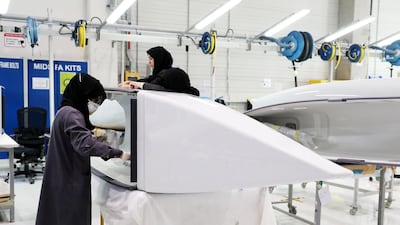The UAE has reached 19th spot in an international index measuring global knowledge.
The Emirates jumped up six places from number 25 last year, highlighting an “exceptional performance” in just 12 months.
Leaders attributed the rapid rise to the country’s continuing focus on developing its technology and education sectors.
A greater emphasis on growing environmental issues across the region could even push the UAE into the top 10 places globally, according to experts.
The country ranked 46th in the environmental category last year and was 41st this year.
“It’s very difficult for any country to jump even one or two ranks but the UAE has improved across the indices," said Hany Torky, chief technical advisor at the United Nations Development Programme’s Arab Knowledge Project.
“All oil-based countries have a low rank in environment because of carbon dioxide emissions. The UAE has to work a lot on this. If it does, it may go up into the top 10.”
_________________
Read more:
Dubai Knowledge Summit told of joint plan to eradicate illiteracy in the Middle East
Teach for All and Saudi's MiSK to be honoured at UAE's Knowledge Summit
Growth in the knowledge economy
_________________
The Global Knowledge Index was created by the United Nations Development Programme and measures the performance of 134 countries worldwide.
It was first launched in 2017 along with the Mohammed bin Rashid Al Maktoum Foundation, and ranks knowledge based on higher education, pre-university education, technical and vocational training, information technology, scientific research and innovation, and economics and the environment.
The specific types of variables it measures include enrollment rates, graduation numbers, dropout figures, unemployment, life expectancy, literacy and regulation.
The results of this year’s index were announced at a summit in Dubai organised by The Mohammed bin Rashid Al Maktoum Knowledge Foundation.
The two-day event saw experts from a wide variety of sectors come together to debate future development strategies.
Switzerland was announced as topping the list this year, followed by Finland, Sweden, US and Luxembourg.
Ranked at number 19, the Emirates is the first Arab country to break into the world top 20 list.

"The UAE’s move up the rankings from 25 to 19 is an exceptional performance,” said Jamal bin Huwaireb, chief executive of the Mohammed bin Rashid Al Maktoum Foundation, an educational fund set up in 2007.
“The country’s strategy has been to focus on developing education and its infrastructure and this was reflected in the results.
"The nations that remain ahead [in the list] are European or Asian states that have long histories in the field of knowledge.”
In research, development and innovation indicies, the UAE ranked 37th last year and is 36th today.
In pre-university education, the country ranked 16th in 2017, but this year rose three places to 13th place.
Similarly, in technical or vocational education, the Emirates also saw a rise. It was ranked 24th in 2017 but now stands at 14th.
“The improvement shows they have very fast development and an efficient strategy for education,” said Mr Torky.
"The UAE has to look to the future and think of future strategies. They also have to focus on the youth because youth are very important in a knowledge economy.
“This is a positive power for society but can also become a negative power.”
Mr Torky recommended the Emirates also concentrated on developing problem solving and communication skills among its young people.
“To improve further, the UAE has to focus on block chain, artificial intelligence, cybersecurity and biotechnology,” he said.


